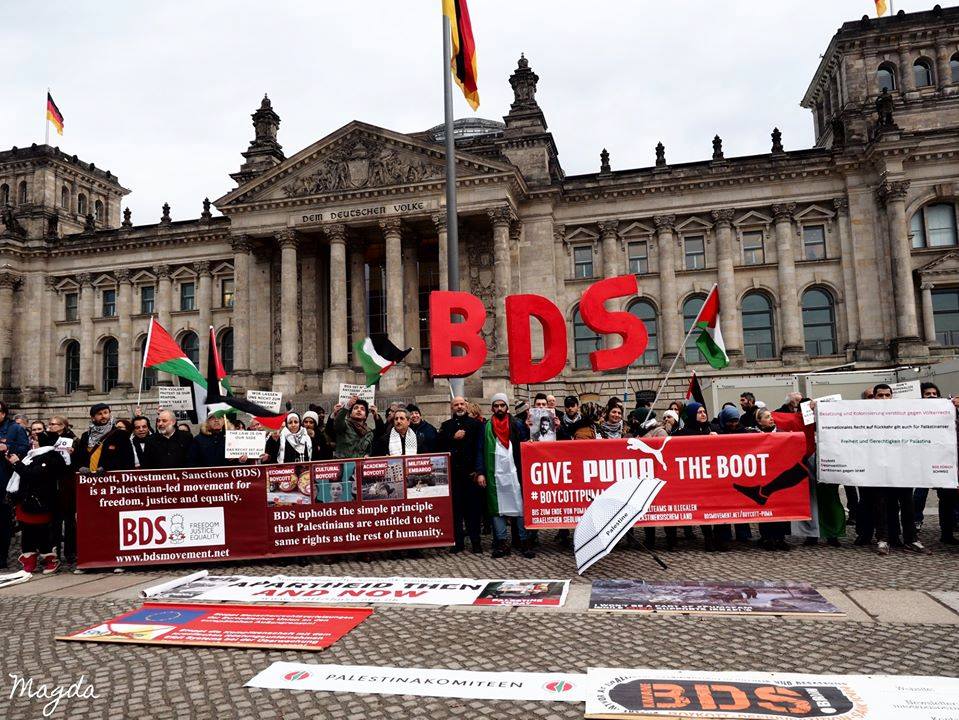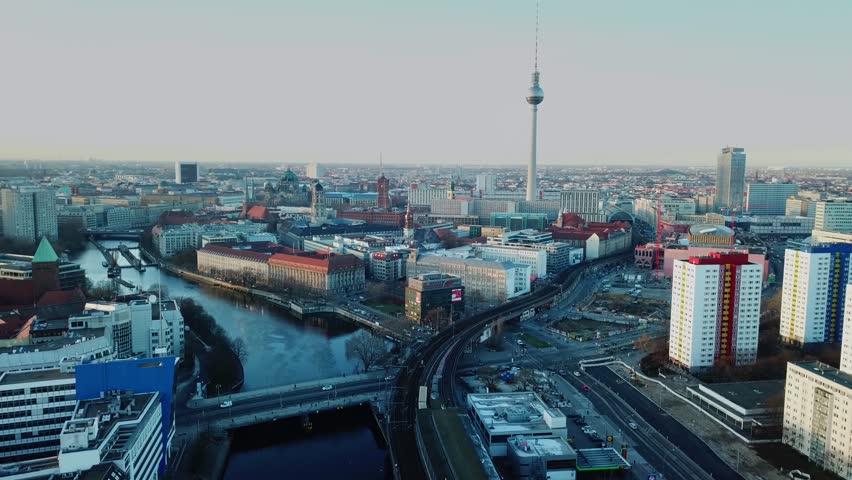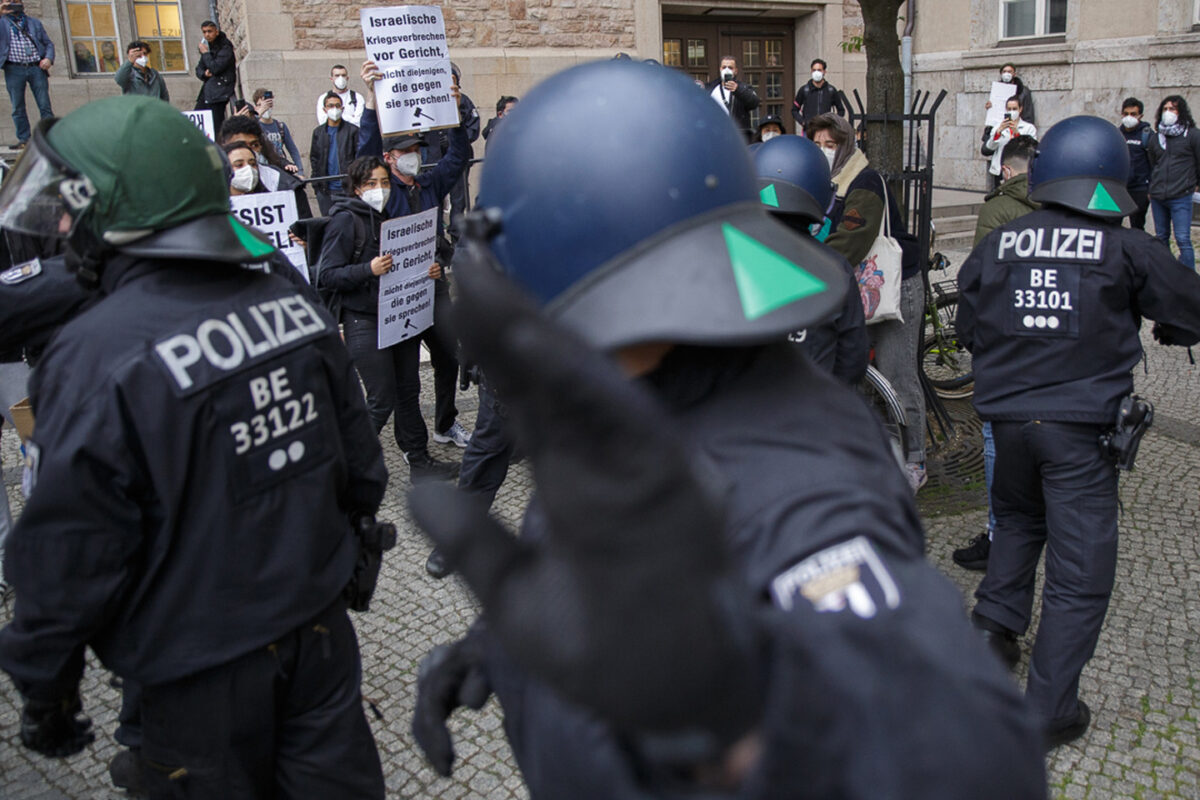In early December, a group calling itself the working group’ Initiative GG 5.3 Weltoffenheit’ (‘open-mindedness’) contacted the German press, promising a “joint statement by all cultural and scientific institutions taking part on diversity of opinion in public debate in the light of growing racism and antisemitism in society”. This message sounded worthy, but not particularly spectacular or exciting. [1]
The press release was followed on 10th December by a press conference jointly held by around 20 German cultural institutions. It was an impressive list of organisations – from the ‘Deutsches Theater’ who hosted the conference, to the ‘Goethe Institute’ and the ‘Centre for Research on Antisemitism’. This was, Itay Mashiach notes, “a group of senior figures whose influence in the German cultural world cannot be over-estimated” [2].
From the opening remarks, it was clear that this was no ordinary press conference. A “plea for open discourse” was read out calling for “an active commitment to heeding a diversity of Jewish positions and an openness toward non-European perspectives.” [3]
The statement said that “the application of the parliamentary BDS resolution by the Bundestag is cause for great concern. We reject the BDS boycott of Israel since we consider cultural and scientific exchange to be essential. At the same time, we consider the logic of counter-boycott, triggered by the parliamentary anti-BDS resolution, to be dangerous. By invoking this resolution, accusations of antisemitism are being misused to push aside important voices and to distort critical positions.” [4]
In any other country, these words may not sound particularly radical – in the German context they were dynamite. I will explain the importance of the Bundestag resolution, but first let me relate some of the speeches made at the press conference.
What was said at the press conference [5]
The first speaker was Hanno Loewy, director of the ‘Jewish Museum’ in Hohenems, Austria. Loewy said that many people believe that Israel is a result of colonialism – a belief that he finds one-sided but legitimate. He went on to say that currently Jews have a Right of Return which is forbidden to Palestinians and that Israeli-Palestinian dialogue groups are victims of the campaign against BDS.
Loewy was followed by Stefanie Schüler-Springorum, the head of the ‘Centre for Research on Antisemitism’ based in the Technical University Berlin. Schüler-Springorum said that the IHRA (International Holocaust Remembrance Alliance) definition of antisemitism, which is increasingly being deployed and recommended by institutions, is being used to stifle criticism of Israel. Although the definition has now been rejected by its own author.
Schüler-Springorum’s fear that the Bundestag resolution excludes open debate was shared by Johannes Ebert, the director of the ‘Goethe Institute’. Thomas Oberender, Intendant of the Berliner Festspiele showed how this works in practise by noting that artists from Arab countries have been not able to play at the PopKultur festival. Oberender went on to warn against confusing ‘Islam’ with ‘Islamism’.
Susan Neiman, the director of the ‘Einstein Forum’ in Potsdam was introduced as a Jewish philosopher. She explained that she has taken German citizenship after Donald Trump was elected US president. Neiman noted that Albert Einstein had called on Israel to protect the rights of Arabs and had called the Deir Yassin massacre “fascist”. She noted that the BDS resolution would mean that neither Einstein nor Hannah Arendt would be able to be invited to speak at a meeting in Germany.
Two speakers said that the atmosphere reminded them of their youth in the DDR. Others noted that many supporters of BDS are victims of colonialism in the Global South like Desmond Tutu and that the Bundestag resolution stood in the way of diverse and free art. Rounding off, Thomas Krüger, President of the ‘Bundeszentrale für politische Bildung’ (Federal Agency for Civic Education) said that “Freedom of Art is not possible without open-mindedness.”
This final statement (in German “Kunstfreiheit ist ohne Weltoffenheit nicht zu haben”) was reflected in the name of the organisers of the press conference, the Initiative GG 5.3 Weltoffenheit. This name refers directly to Article 5.3 of the German constitution (Grundgesetz or GG), which says that “art and science, research and teaching are free.” [6]
What’s it all about? The Bundestag Resolution
The Bundestag resolution criticized in the press conference was passed on May 17th, 2019 under the name Resisting the BDS Movement with Determination – Combating Antisemitism. Shir Hever described this as a “non-binding parliamentary resolution, adopted by a large majority on May 2019, which condemned the ‘Boycott, Divestment and Sanctions’ (BDS) movement targeting it as “antisemitic”. Hever also noted that the resolution compared BDS to the Nazi regime’s demands not to buy from Jews.” [7]
All the mainstream parties supported the resolution. Die LINKE submitted their own motion (which was, in all honestly, not much better), as did the Alternative für Deutschland (AfD), whose resolution was much worse and predated the others. The resolution was non-binding, meaning that in theory, it had no effect in the real world. Although as Stefanie Schüler-Springorum rightly asked, if it had no consequences, what was the point of bringing the resolution in the first place? [8]
In practise, the resolution made a significant contribution to the growing atmosphere of intimidation that has been used to stifle debates on the Middle East in Germany. Indirectly, it also empowered similar attempts to silence Israel’s critics internationally, most notably the campaign against Jeremy Corbyn in the UK. [9]
The resolution threatens to cut off funding to any organizations that “actively support” the BDS movement [10]. The justification was that “the pattern of argument and methods of the BDS movement are anti-Semitic.” This reinforced an existing feeling that equated support for or even discussion of BDS with antisemitism.
Aleida Assmann argues that
“a term from the metaphorical ‘Lexicon of Stalinism’ has since been reissued for this fact, namely ‘guilt by association.’ Even the proof of an indirect connection to the BDS is considered contaminating. Many peace groups and cultural organizations reject the BDS, but if they are committed to a peaceful future for one or two states and three religions in the Middle East, they can hardly avoid cooperating with groups that belong to the BDS. This restriction leads de facto to a prevention, even criminalization of their decades-long peace activities.” [11]
Writing in ‘die Zeit’ on 16th December, Schüler-Springorum said that the Bundestag resolution has created “a climate of legal insecurity, which leads to institutions racking their brains, not about the quality of a project, but about the political stance of those involved to the Middle East conflict”, resulting in a “form of advanced self-censorship. [12]”
As I was finishing this article, the Bundestag research service submitted its conclusions regarding the BDS resolution, and found it to be only an opinion of the Bundestag, without legal significance and having no validity under the constitution. It also determined that excluding BDS supporters from publicly finances spaces is unconstitutional and therefore illegal. [13]
The AfD take advantage
But, the resolution was never really interested about the constitution. As Iris Hefets from the ‘Jewish Voice for Peace in Germany’ says, the people proposing the motion were clear from the start that it was unconstitutional. “Therefore it was only a motion. Such a motion can become a ‘soft law’ and that is exactly the problem with it. First you do not let people perform or lecture, then they go to court and win [14] … or they do not go to court, or get tired. Or you do not invite them to lectures.” [15]
To back up her comments, Hefets notes that Bundestag president Wolfgang Schäuble is on record as saying that Germany has no plans to ban the BDS campaign because: “Our constitution doesn’t give the parliament much room to enact prohibitions, and rightly so, because we believe that is up to an independent judiciary ”. [16]
The resolution may have had no legal relevance, but it did help change the political climate to favour some unsavoury forces. Having already used the debate to position themselves, the racist and increasingly fascist Alternative für Deutschland (AfD) felt empowered to go onto the offensive. On 29th January 2020, they brought a motion ‘Improve the relationship between the EU and Israel’ to the Bundestag, using the following justification.
“In the Bundestag resolution ‘Resisting the BDS Movement with Determination – Combating Antisemitism’ the Bundestag has clearly determined that the methods and patterns of argumentation of the BDS movement are antisemitic, and has resolved that the BDS movement cannot be supported by federal resources in any way.
The name of the resolution being brought today ties in with the Bundestag antisemitism resolution. The credibility of these resolutions in essence depend on the national government campaigning for their realisation not on a national level but also on that of the EU, which assures that no German tax money is used to indirectly profit the BDS movement.” [17]
Let’s take a couple of minutes to parse this statement. For a start, let us wonder at the effrontery of such a party. Its councillor Wolfgang Gedeon wrote books which claimed that “talmudic ghetto Jews” are the “enemy of the Christian occident.” [18], and its leader in Würzburg Herold Peters-Hartmann saw it as a “very large problem” that Jews have “very very much cultural influence”. [19] Yet – these are the people who claiming to be leading the fight against antisemitism?
But there is a much more important issue at play here. By accepting the terms of the Bundestag resolution – that a campaign which criticizes Israel is inherently antisemitic – the mainstream parties have helped empower an antisemitic party which can live with Israel’s oppression of Palestinians but which has no interest in protecting Jewish people.
The case of Achille Mbembe
The case most often cited by speakers on 10th December was that of the Cameroonian philosopher Achille Mbembe. The statement presented at the press conference says that “it is unproductive, even detrimental to the democratic public sphere to exclude vital voices from critical dialogue, as occurred in the debate surrounding Achille Mbembe earlier this year.” [20]
Here’s what had happened. In early 2020, Stefanie Carp, organiser of the Ruhrtriennale festival invited Mbembe to speak. Germany’s antisemitism commissioner Felix Klein ordered Carp to un-invite Mbembe, although Carp recalls “my impression was that he had not read one line of Mbembe personally. I read him whole pages on the phone – the context of these quotes – and that made him fall a bit silent, but then he said, ‘Yes, but I still think he’s antisemitic.’” [21]
What were the charges? In his detailed article for Ha’aretz, Itay Mashiach explained:“Ten years ago, they noted, Mbembe signed a petition calling for the severance of ties between the University of Johannesburg and Ben-Gurion University in Be’er Sheva, because of the latter’s connections with the Israeli army. BDS welcomed the petition, the Bundestag classifies BDS as an antisemitic organization – therefore, Mbembe is an antisemite.” [22]
Michael Rothberg adds “the German establishment’s accusations against Mbembe derive from passages in his essay “The Society of Enmity,” which appears in German in the book ‘Politik der Feindschaft’ (2017). The first passage concerns a comparison (but not an equation, as FDP politician Lorenz Deutsch claims) between South African apartheid and the Israeli occupation of Palestinian territories. In Germany, it is simply taken for granted that such a comparison is intrinsically antisemitic.” [23]
Jonathan Ofir summarizes: “Here are the critical Mbembe quotes:
- Moreover, given its ‘hi-tech’ character, the effects of the Israeli project on the Palestinian body are much more formidable than the relatively primitive operations undertaken by the apartheid regime in South Africa between 1948 and the early 1980s.
- The apartheid system in South Africa and the destruction of Jews in Europe – the latter, though, in an extreme fashion and within a quite different setting – constituted two emblematic manifestations of this phantasy of separation.
Now, let me ask: How do you reach from here to antisemitism, Holocaust relativization or Holocaust trivialization? Even in this clinical isolation, the quotations are quite logically formed. The latter quote even makes a crucial point of distinguishing the Holocaust from South African Apartheid. [24]
As it happens, Mbembe had no contact with BDS, and even the petition that he signed was not from the BDS movement but from a group of South African scientists. [25] But that’s not the main point. A group of mainly gentile white Germans had insisted that they and only they, could tell Jews and people from the Global South what counted as antisemitism.
It is quite possible that if Mbembe were Palestinian he would have not received the same level of support, but, as we say in Germany, ‘immerhin’. [26] Carp said that she’d invited Mbembe because “I wanted to focus on voices from the Global South” and that he assigns “colonialism and racism, which make people a product to capitalism and consequently to the dark underside of liberal democracy.” [27]
In the ‘Journal of Genocide Research’, Ulrike Capdepón and A. Dirk Moses remarked that
“Historians have been arguing for decades about the colonial origins of the Holocaust. And then, as now, smearing those who drew such links as antisemitic was the order of the day. These attempts did not make the German mainstream, however, in part because respectable, white, male professors were the targets, in part because Israel was not at issue. But when an African scholar added the taboo ingredient of Israel to this continuity debate all hell broke loose, exhibiting what one of us calls ‘anxieties in Holocaust and Genocide Studies.’” [28]
No Isolated Case
Mbembe’s case attracted particular scandal because he is an intellectual with international recognition, but it is by no means an isolated case. Irit Dekel and Esra Özyürek argue that
“Mbembe’s disqualification from the right to speak in public for being judged as an antisemite is not an isolated event but part of a long series of other high-profile cases in which Arab, Turkish, African, and Jewish background Germans and non-Germans, a significant number of them women, have been accused of antisemitism or of promoting antisemitic sentiments.“ [29]
Dekel and Özyürek continue
“Faruk Sen, formerly director of Center for Turkish Studies in Essen; in 2009, Philippa Ebéné, director of the Werkstatt der Kulturen; in 2019, Yasemin Shooman, then director of the Jewish Museum Berlin’s Academy Programs, and Peter Schäfer, then director of the Jewish Museum Berlin. Similarly, cultural organizations that represent and cater to minority groups such as Theater X in Berlin and Jewish voices for Peace have been accused of being antisemitic, and have subsequently lost access to funding.” [30]
There were many other cases, too numerous to list here, from both the political and cultural world. Here are some of the most notorious.
Itay Mashiach recounts the case of Israeli singer and human rights activist Nirit Sommerfeld, whose band performs texts and songs in both German and Yiddish about Kristallnacht, yearnings for Israel and such things as Hanukkah in the Diaspora.
“Last year, she rented a club for an event marking the band’s 20th anniversary. The club’s owner sent her a formal letter in which she was called upon ‘to confirm in writing that no antisemitic content will be given expression within the framework of the performance’ – without which the club would be compelled to cancel the show.
Sommerfeld fired off a strongly worded reply. ‘For 10 years, we have been appearing with a program at whose center is the story of my grandfather, who was murdered in a concentration camp,’ she wrote, and added in bold font: ‘May I remind you that [he was] murdered by antisemites in Sachsenhausen?’ [31]
Hakim Bishara reports similarly that
“in October of 2019, Lebanese-American artist Walid Raad was denied a cash prize from the German city of Aachen after refusing to condemn the BDS (Raad was eventually awarded the prize). A month before that, the German city of Dortmund withdrew its decision to award the British-Pakistani novelist Kamila Shamsie a literature prize, citing her support for BDS. [32]
Jonathan Ofir again: in 2019,
“the German Jewish Voice for a Just Peace in the Near East, received a peace prize from the city of Göttingen, which Israel-apologists sought to have cancelled, suggesting these are the ‘wrong kind of Jews’. In 2016, after an incitement campaign by the Israeli government and its local supporters, the bank account of the organization was closed.
This was in fact the first time in the post-WW2 era, that an account held by a Jewish organization in Germany was closed. It was explicitly explained to them that this was for political reasons – if they would rescind their support for BDS, they could reopen the account. Only after a massive protest campaign, were they allowed to reopen the account.” [33]
Shir Hever from the Jewish Voice for a Just Peace Göttingen explains further: “the bank for social economy (Band für Sozialwirtschaft) closed the account in 2016, but re-opened it after a massive protest campaign erupted. Then pro-Israelis accused the bank of antisemitism and the bank wanted to condu an investigation whether the JS is antisemitic. We refused of course. In 2019 the bank closed the account again.” [personal correspondence]
In June 2019, not long after the Bundestag resolution, Peter Schäfer resigned as director of Berlin’s Jewish Museum, following criticism of the museum’s exhibition “Welcome to Jerusalem”. Along with many other people (but not some of its critics like German Jewish community head Josef Schuster), I visited the exhibition, which was impressive. It did not contain anything that should be seen as controversial, other than the acknowledgement that some Palestinians also live in the city.
In October 2020, Jewish artists in Berlin organised a month of lectures and an exhibition as part of a project they call ‘The School for Unlearning Zionism’ (SfUZ). After accusations of supporting BDS, funding for their “October Program” was denied from the Art School where the program was planned and took place. The ‘Antonio Amadeus Foundation’, a central foundation for combating antisemitism, added the SfUZ to its database of antisemitic incidents – between swastikas on a sports field in Leipzig and a violent attack on a student wearing a kippa at the entrance to a synagogue in Hamburg. [34]
In an interview with ‘theleftberlin.com’. Yehudit Yinhar, one of the organisers, reacted sanguinely:
“our Program is not about BDS but we refuse to accept “BDS: yes or no?“ as the parameters of our conversation. German institutions cannot claim ownership on which Jewish, Israeli and Palestinian stories may be told publicly – and which should be boycotted (ironically enough).”[35]
Perhaps the most Kafkesque of all these stories comes from Judith Bernstein, former president of the ‘German-Israeli Society’ (Deutsch-Israelische Gesellschaft):
“in September 2019 we invited a journalist from the Spiegel to speak about ‘the role of Israeli lobby organisations in German politics’. Following pressure from Frau Knobloch [Charlotte Knobloch, former President of Central Council of Jews in Germany] the Caritas group cancelled the room without notice and banned us from entering the building.” [36]
Where now?
Following the press conference on 10th December, well over 1,000 artists, academics, writers and cultural workers have signed an open letter “Nothing Can Be Changed Until It Is Faced”. The signatories say that they “view the [Bundestag] resolution’s curtailment of the right to boycott as a violation of democratic principles. Since being passed, the resolution has been instrumentalized to distort, malign and silence marginalized positions, in particular those which defend Palestinian rights or are critical of the Israeli occupation. [37]
The open letter goes on:
“The resolution has created a repressive climate in which cultural workers are routinely asked to formally renounce BDS as a prerequisite for working in Germany. Meanwhile, cultural institutions are increasingly driven by fear and paranoia, prone to acts of self-censorship and to pre-emptively de-platforming and excluding critical positions. Open debate around Germany’s past and present responsibilities in relation to Israel/Palestine has been all but suffocated.” [38]
The letter concludes with a quote from James Baldwin: “Not everything that is faced can be changed. But nothing can be changed until it is faced.” [39]
The apparently uncontroversial press conference has thrown a stone into the water which has produced massive ripples. For this reason alone, it is to be welcomed. But is this enough? Almost all the speakers at the conference took pains to emphasize that they personally rejected BDS. It is a great leap forward that so many important cultural figures have made a stand for the right to discuss boycotting Israel, but what exactly are we supposed to discuss?
Although not all Palestinians support BDS, the demands of BDS are anchored in international law and supported by all relevant actors in Palestinian civil society. [40] It emerged at least in part because Palestinians and their supporters had run out of options. Palestinian kids with stones were unable to militarily defeat the mighty Israeli army and most foreign governments were too keen on maintaining good relations with Israel. And many so-called supporters of Palestinian rights, particularly in the rich North, were quick to blame “violence on both sides” and effectively ordered the Palestinians to find a peaceful solution.
Well, if it’s not BDS, what is this peaceful solution supposed to look like? At a meeting in Frankfurt-Main, which itself was threatened with a ban, [41] Judith Bernstein said the following: “BDS changed the discourse in Germany. BDS does not just speak of occupation, but of apartheid, a word that one may not use in Germany. In Israel, however, the phrase is used on a daily basis.” [42]
This article is not about the strengths and weaknesses of BDS. But if you want to understand the campaign better, there is plenty of information at https://bdsmovement.net/news/heres-what-you-need-know-about-bds and elsewhere. Any serious debate about how the Palestinians can be freed from their current horror must at least acknowledge the campaign.
In Germany and elsewhere, we are faced an almost unique opportunity to discuss how we can support the Palestinian struggle for freedom, equal rights and self determination and to oppose the current international attacks on debate. Let’s not squander that opportunity.
Footnotes
1 Many thanks to Yehudit Yinhar for her comments on an earlier version of this text and to Iris Hefets and Shir Hever who also gave useful advice.
3 https://www.humboldtforum.org/wp-content/uploads/2020/12/201210_PlaedoyerFuerWeltoffenheit.pdf
4 Ibid
5 The summaries of the speeches that follow come from the notes that I took during the press conference. I believe that they are 100% accurate but apologies if any minor errors have slipped in.
6 https://dejure.org/gesetze/GG/5.html
7 https://www.middleeasteye.net/news/germany-israel-palestine-culture-bds-antisemitism
8 https://www.zeit.de/2020/53/antisemitismus-israel-bds-resolution-kritik-gg-5-3-weltoffenheit
9 See my article https://www.theleftberlin.com/post/the-lonesome-martyrdom-of-jeremy-corbyn
10 https://www.dw.com/en/german-parliament-condemns-anti-semitic-bds-movement/a-48779516
11 https://www.tandfonline.com/doi/full/10.1080/14623528.2020.1847861
12 https://www.zeit.de/2020/53/antisemitismus-israel-bds-resolution-kritik-gg-5-3-weltoffenheit
13 https://taz.de/Streit-um-BDS-Bewegung/!5740197/
14 Facebook comment
15 Personal correspondence
16 https://www.timesofisrael.com/germany-wont-outlaw-bds-head-of-bundestag-says/amp
17 https://dip21.bundestag.de/dip21/btd/19/168/1916855.pdf
18 https://www.bpb.de/politik/extremismus/rechtsextremismus/257899/die-afd-und-der-antisemitismus
20 https://www.humboldtforum.org/wp-content/uploads/2020/12/201210_PlaedoyerFuerWeltoffenheit.pdf
22 Ibid
23 https://www.goethe.de/prj/lat/en/dis/21864662.html
26 I have never been able to find an acceptable English translation of this term but the nearest I’ve come is to imagine a grumpy teenager saying “whatever”.
28 https://www.tandfonline.com/doi/full/10.1080/14623528.2020.1847851
29 https://www.tandfonline.com/doi/full/10.1080/14623528.2020.1847859
30 Ibid
35 https://www.theleftberlin.com/post/yehudit-yinhar-on-unlearning-zionism
36 Taken from notes for a speech given in Frankfurt on 12th December 2020
37 https://nothingchangeduntilfaced.com/
38 Ibid
39 Ibid
40 https://bdsmovement.net/call
41 https://www.bt3p.org/news/stadtffm/urteil
42 Taken from notes for a speech given in Frankfurt on 12th December 2020




